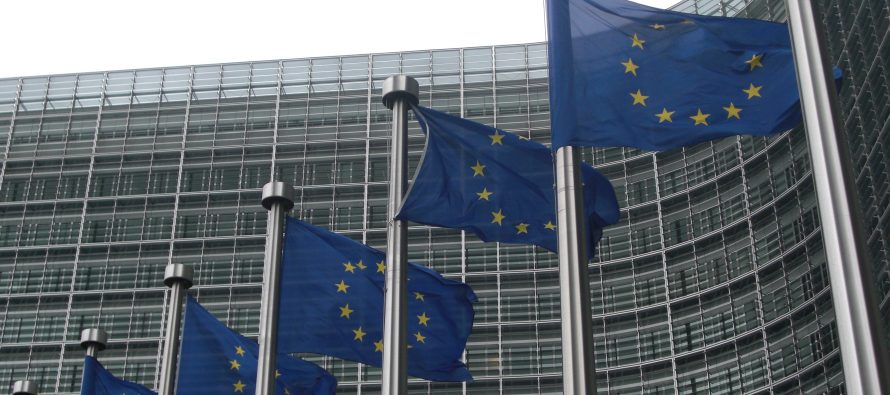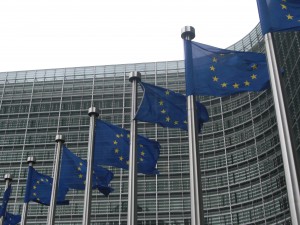Rule of law efforts led the news in 2014

TIRANA, Dec. 26 – As 2014 ends, Tirana Times looks at the top stories of the year, dominated by the authorities’ efforts to establish strong rule of law, EU integration successes, the Bank of Albania scandal and several other stories.
January
Police bust murder-for-hire group
Albanian police say they have scored a major victory on organized crime with the discovery of a group suspected to be involved in a series of serious deadly crimes in the past two years in four major Albanian cities. Three people have been arrested, among them a 30 -year-old man who is suspected of being a contract killer and has allegedly committed at least 20 murders in Albania and Greece. Police found an arsenal of weapons and explosives in his Tirana apartment. Using a confidential informant, police said they caught the group as they were preparing to murder of another businessman in Tirana. The police operation came as Albanians have become increasingly worried about a series of remote-controlled explosions that have killed or wounded several people in Tirana, Vlora, Durres and Shkodra.
February
Authorities look to tame deadly roads
Under pressure from the rising death toll and high profile crashes, authorities have been prompted to act with a series a series of measures to strengthen law enforcement, including banning the use of the workhorse of passenger transportation in Albania – furgon minivans – from serving as alternative to buses in inter-city transportation. The country’s transport and interior ministers, Edmond Haxhinasto and Saimir Tahiri, have presented a package of legal amendments and reforms that will aim at improving the road security in the country. The new package has 60 measures as part of operational and institutional reforms. In addition to the furgon ban, there will be investment in road safety like the closure of surplus access points into highways, adding more signals and improving signal quality. Fuel stations will be more limited in number to avoid unnecessary entry-exit point on national roads.
March
Institutions move to address rule of law concerns
Albania’s government and state institutions are moving to amend legislation and increase enforcement to address growing concerns over rule of law in the country. The government said earlier this week it plans to amend the country’s key crime legislation, the penal code, in an effort to introduce tougher punishments for a variety of criminal trends that have created negative perceptions about rule of law in Albania, including the use of explosives, electricity theft and drunk driving. The illegal possession of the explosive devices will see sentences of to 20 years in prison, a steep increase from the current five years. The proposed change comes following more than a dozen instances in which small amounts of explosives have been used in acts or targeted violence across Albania in recent months. New penalties are also to be introduced against electricity theft, with individuals up to three years for individuals and up to five years for heads of businesses or institutions.
April
Officials deny military trafficking accusations
Allegations launched by the opposition Democratic Party that the army logistics have been exploited for illegal drug trafficking continued to dominate headlines over the months, despite earlier strong and harsh denials from the army and other government institutions. The army chief-of-staff made a strong statement denying that army logistics or its basis have been illegally exploited by organized crime to transport drugs. There exists no evidence to prove the conjecture expressed in the last weeks. Air forces have documentation from the specialized structures of the Alliance monitoring Republic of Albania’s airspace, which confirm there have been no renegade planes in our space at the date and the time quoted in the media, said a statement of the armed forces.
Demand growing for second international airport
Demand for lower prices, more competition and easier geographical access is placing increased pressure on the Albanian government to review a 20-year concession agreement with an international consortium that forces Albania to have Tirana International Airport as the country's sole international gateway. After upgrading its facilities to European standards from 2005 to 2008, Mother Teresa International Airport, which is managed under concession by an international consortium, has seen its passenger numbers more than double to a high number of 1.8 million per year in 2011. TIA is largely seen as a success story from the business standpoint, but it has an ace up its sleeve. The airport has a monopoly on international flights from and to Albania. A clause in the concession contract between the Albanian government and international consortium, achieved following an international tender in 2003, stipulates that TIA must be Albania's sole international airport for 20 years. Critics say the clause puts Albania at a disadvantage compared to neighboring countries and allows the airport to charge higher fees due to a lack of competition. They also argue that parts of Albania that are a long drive away from Tirana need easier geographical access for their residents and for attracting foreign tourists.
May
Albania goes on integration offensive
The Albanian government says it is determined to prevent any further delays in its application to become a candidate for EU membership and urges EU member states to look at the big picture. Albania’s prime minister, Edi Rama, has been pretty open in interviews with international media with his displeasure with EU members states over Albania’s bid to join the union. Calling a decision by five members states last December to delay granting Albania official candidate for membership “not very European,” he said it was “ridiculous” that Albania is still stuck in its EU bid. Rama’s comments appear to be part of a concerted effort in the last month by the Albanian government to pressure EU members states to prevent any further delays in its EU application and to present not only the benefits Albania would get from integration in the European Union, but also to also to focus on the benefits EU member states would get from having Albania join the bloc.
June
Police storm Lazarat ending years of lawlessness
Albania’s government decided to end years of lawlessness in Lazarat, a small enclave in southern Albania often referred to as “Europe’s marijuana capital” for its massive production of cannabis. About 800 police officers, backed by armored vehicles, stormed the village Monday in a multi-day operation that has netted more than 10 tons of drugs and tens of arrests. Suspected marijuana growers fired rocket-propelled grenades, mortars and machine guns at officers during the raid, but police advanced slowly capturing the village in a couple of days. At least two police officers and one civilian were wounded during the operation. Lazarat had become a symbol of lawlessness in Albania and internationally as a no-go area for Albanian police who feared a confrontation with gangs inside the village would lead to loss of life in among officers and residents in the village located 230 kilometers south of Tirana. Gangs based in Lazarat are believed to produce about 900 metric tons of cannabis a year, worth about 4.5 billion euros ($6.1 billion) — roughly half of the small Balkan country’s GDP. Over the past few weeks, Albanian authorities have launched a nationwide operation to uproot the cannabis plantations as an effort to show Albania is serious in its pledge to fight organized crime as part of its bid to join the European Union.

Albania became an official candidate for membership in the European Union in 2014.
EU grants candidate status
Albania has taken the next step in its long path to European Union membership, as EU members states officially agreed this week to make Tirana an official candidate to join the bloc. The decision was welcomed by the entire political class in Albania. “It is a very important step forward in what is set to be a long and difficult journey,” Prime Minister Edi Rama said in a press conference. Albania had repeatedly failed to obtain the status since first applying in 2009, including six months ago when despite a positive recommendation by EU's executive branch, member states decided they wanted to see more results before granting the status. The decision is the first major hurdle for Albania, which wants to become a member of the EU, a bloc of half a billion people that forms the world’s biggest economy. Full membership could take a decade or more as Albania will have to now go through a lengthy process to meet many requirements in tackling crime and corruption, and bringing its judiciary and administration to European standards.
July
Parliament passes administrative, judicial reforms
Albania's governing coalition approved a major territorial and administrative reform before parliament went on vacation in August. The opposition boycotted the vote and vowed it will never recognize it. The government says the current high number of municipal units is expensive and inefficient for a small country like Albania, and apparently communes spend about 24 million dollars a year, on salaries alone, while generating little or no tax income on their own or making any investments into their local communities. As such, a new territorial map that would trim the number of local governing units down to 61 is aimed at better management, officials say. Later in the year, the reform would hold up in Constitutional Court.
The parliament also passed a draft law this week that reforms the High Council of Justice. KLD as it is known by its Albanian acronym, is the highest institution governing the judiciary in Albania, and the government says reforming it is the first step to fight graft among judges and restore public trust in the system. The government wants to make it easier to prosecute judges accused of corruption and have a greater say in the work of KLD, a constitutionally independent institution.
August
Central bank reeling after $7-million inside job heist
In what constitutes one of the largest thefts in the history of Albanian state, authorities are investigating the illegal removal of more than $7 million in Albanian currency from a transfer area of the central bank over the past four years. One of the central bank’s staff members has confessed to stealing the cash over four years to feed his gambling addiction, prosecutors said. But prosecutors are not convinced that all the money was gambled away and are looking at bank transfers and property transactions to determine if any of it is was transferred outside the country or whether it can be recuperated through property confiscation. The theft has sparked concern over the security measures at the central bank and has led to parliament members calling for an investigation of the independent institution. The bank’s governor, Adrian Fullani, would ultimately be arrested and sacked for failing to prevent the theft.
Gov't moves against ‘pyramid’ private universities
A Ministry of Education investigation into the practices of private institutions of higher learning in Albania has led to a government decision to close 17 private universities ahead of the new academic year and to suspend enrollment in another 13. In addition, the government has closed seven public university satellite campuses. The move means about two thirds of the country's private higher education institutions are to be closed or suspended following Ministry of Education investigation that found they did not meet legal and quality standards. Among the ones to be suspended is Albanian University, formerly known as UFO, one of the country's largest. Twelve private universities were allowed to continue operations, noting conditions for improvement. The government decision comes after years of concern that many of the private universities in Albania failed to meet basic standards. Critics had pointed out some of the private universities were little more than diploma mills.
September
Central bank governor arrested, sacked
Following the arrest of the central bank governor, Ardian Fullani, and his dismissal by the bank's board, authorities are looking to shore up operations at the key financial institution by finding a replacement for Fullani and others bank officials who have been either sacked or resigned as a result of an investigation into the theft of nearly $7 million at the Bank of Albania. Prosecutors arrested Fullani and the bank's senior auditor, Elivar Golemi, on Sept. 5, charging them with abuse of office for alleged mismanagement in connection with a the large theft from the bank's reserves that was discovered in July.
Prosecutors indict three MPs
Two lawmakers from the ruling Socialist Party have been indicted for allegedly punching an opposition counterpart inside the parliament building earlier this year, according to prosecutor general’s press office. Arben Ndoka and Pjerin Ndreu have been accused of violence they have exercised on an opposition lawmaker, Gent Strazimiri, of the main opposition Democratic Party. The alleged incident happened in July, and video from the parliament's close circuit television cameras clearly shows at least one of the accused MPs punching the other. Strazimiri’ case was used by the opposition Democrats as a key reason to boycott parliament for months, a boycott that is ongoing.
Pope hails Albania’s inter-faith harmony in historic visit
In a historic visit to Albania, Pope Francis led an open-air mass attended by 300,000 in Tirana’s Mother Teresa Square, praising Albania’s religious harmony as an example for the rest of the world. He also urged Albanians not to forget the crimes of the atheist communist regime and to be hopeful and have faith in a better future. The Pope had a busy agenda during his 11-hour visit to Albania -- the first European trip outside Italy -- including meeting with the country’s political and spiritual leaders as well as honoring members of the clergy that suffered under Albania’s former communist regime. Albanians had prepared a warm welcome. Wherever Pope Francis went, the streets were lined with thousands of people. The capital's main Nation’s Fallen Boulevard was decorated with Albanian and Vatican flags – as well as giant portraits of 40 Catholic priests who were persecuted or executed under Stalinist dictator Enver Hoxha.
October

An Albanian flag is flown over the pitch during the Euro 2016 Group I qualifying soccer match between Serbia and Albania at the FK Partizan stadium in Belgrade October 14, 2014. The Euro 2016 qualifier between Serbia and Albania was halted in the first half.
Albania-Serbia match abandoned, relations suffer setback
After years of tension over Kosovo, Albania and Serbia were moving forward to having normal relations toward the shared goal of European integration, and that the ice had thawed. That vision suffered a major setback this week, following violence after the interruption of a football game between the two countries and extreme political reactions to it, which have quickly brought relations to a new low point. The game was tense from the beginning as the Serb crowd hissed loudly over Albania's national anthem and chanted "Kill, Kill, Kill the Siptars," using the Milosevic-era derogatory name for Albanians. They pelted Albanian players with fireworks, coins and lighters when they got the got too close the sidelines. And then the Serb fans saw a small drone-like craft carrying an Albanian banner. And the violence took an entirely new nature with players brawling and fans invading the pitch. The game was ultimately interrupted due to the violence, which saw several Albanian players hurt and left all psychologically traumatized. Instead of condemning the violence of their fans, Serb political leaders quickly went into action to say that the violence was due to the lone Albanian banner, which they said was an officially-sanctioned Albanian provocation.
In mass shooting leads to MP resignation
By the time authorities tallied up the death toll in a shooting at a nightclub in Tirana, four people had died and three suspected assailants were arrested. But prosecutors believe there was a single shooter -- Kostandin Xhuvani -- a name that has both shocked and angered the Albanian public. The son of a prominent Socialist member of parliament, he had already been convicted in another killing in 2011, only to be set free after a short prison sentence, which many commentators at the time saw as application of double standards for the well-connected and the powerful. The MP, Luiza Xhuvani, resigned in tears at a press conference Tuesday night, flanked by Prime Minister Edi Rama, who had earlier been pelted with a torrent of angry comments on social media seeking the MP's resignation and accountability for those responsible for the shooter's light sentence in the earlier killing.
November
Serbia visit breaks ice, highlights tensions
Albania’s prime minister has made the first official visit to Serbia in 68 years to promote cooperation demanded by a joint EU path, but a public spat over Kosovo’s independence placed the spotlight on long-lasting tensions. As Rama, pronounced the words "Kosovo" and "independence" in a joint Belgrade press conference with his Serbian counterpart, Aleksandar Vucic, the face expressions and gestures of the host spoke to the quickly souring mood in the room. Vucic grinned unhappily, took off his translation headphones for a few seconds, as to protest to what he just had heard, then went on to listen again. A few moments later, he jumped to the podium, calling Rama's remarks an unacceptable "provocation in the middle of Belgrade." The very public spat between the two prime ministers over Kosovo quickly put the spotlight on long-lasting tensions during the Nov. 10 first official visit by an Albanian prime minister to Serbia in 68 years, aimed at breaking the ice in bilateral relations as part of a joint European integration path. However, the mere fact that Rama's two-day visit to Serbia took place at all was seen as a step in the right direction for Albania and Serbia. Both countries aspire to join the European Union over the next decade, and EU leaders have made it clear they want the two countries to have warmer relations and saw the meeting as an important first step to that end.
December
Crackdown on unpaid and stolen electricity
After arresting tens of business owners caught stealing electricity, authorities are continuing their crackdown on electricity theft and unpaid bills, with the government already implementing plans to sack public sector employees if they don’t pay what they owe immediately. Prime Minister Edi Rama has said repeatedly government action will not end until all unpaid bills to the state-owned power corporation will be collected. “Not one cent will be tolerated,” Rama said has he fired a deputy minister in December. The government has also offered to cut 80 percent of accumulated interest on overdue bills if the total amount is paid. Payments with installments of no less than 2,500 leks per month are also offered on top of the consumers regular bills. In a move that has caused a lot of debate over its legality, authorities have undertaken another drastic measure -- firing hundreds of employees of the power corporation, prison departments and other public institutions -- because they had overdue electricity bills. However, Albania's ombudsman, Igli Totozani, has asked the government to stop the practice as it is not justified under Albania's laws.




